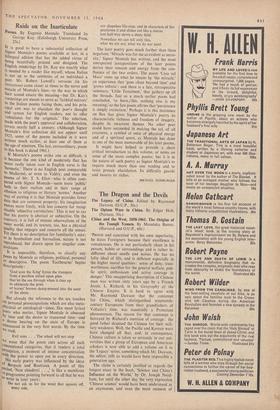Raids on the Inarticulate
IT is good to have a substantial collection of Signor Montale's poems available at last, in a bilingual edition that has the added virtue of being beautifully printed and designed. The English renderings by Dr. Kay are exactly what IS needed by a reader like myself, whose Italian is not up to the subtleties of so individual a Poet. Mr. Robert Lowell's versions (in his /I?lifations) came closer at times to the nerve and muscle of Montale's lines—to the way in which their sound enacts the meaning—but Dr. Kay's renderings are meant to serve as 'faithful mirrors' to the Italian poems facing them, and his prin- cipal aim was to elucidate the poet's thought and syntax for English readers, not to offer 'substitutes for the originals.' The selection, made with the poet's approval and collaboration, covers nearly half a century. (Although Signor Montale's first collection did not appear until 1925, some of the poems included in it were Written much earlier, at least one of them at the age of nineteen. The last, extraordinary, poem 10 this book is dated 1961.) If Montale's poems strike one as difficult, it IS because the one kind of modernity that has never really taken root in English verse is the 'hermetic.' There is no English poet comparable to Mallarm6, or even to Valery; and even the Poems of Mr. T. S. Eliot—who is often com- Pared with Signor Montale—seem more 'public' both in their realism and in their range of allusion to religious or literary 'norms.' Another Way of putting it is that Montale provides fewer data that are common property; his imagination moves more freely, with less concern for recog- nisable 'objective correlatives.' This is not to say that his poetry is abstract or subjective. On the Contrary, it is full of Minute observations of the outer world, and its texture, too, has a physical quality that engages and concerts all the senses. Yet there is no description for familiarity's sake; as in Symbolism and Surrealism, nature is not reproduced, but drawn upon for singular com- positions.
It is impossible, therefore, to classify any Poem by Montale as religious, political, personal or descriptive. The poem 'Eastbourne' begins descriptively :
'God save the King' hymn the trumpets from a pavilion stilted upon piles
that let the sea through when it rises up to obliterate the print of horses' hooves damp-pressed into the sand of the shore.
But already the reference to the sea touches On personal preoccupations which are also meta- PhYsical or ontological—since, like most lyrical Poets who matter, Signor Montale is obsessed bY time and the desire to transcend time—and a theme bearing on the state of Europe is announced in the very first words. By the time
We read, • Evil wins . . . The wheel will not stop
We sense that the poem cuts across all such conventional categories, that it renders a total Perception, a moment of intense concentration With the power to open out in every direction. His early poetry was influenced by the ideas of Bergson and Boutroux. A poem of this Period, 'Non chiederci . . .,' is like a manifesto ;)1. Programme pointing forward to all that he was lo write in later years:
Do not ask us for the word that squares off, every side, our shapeless life-urge, and in characters of fire proclaims it and shines out like a crocus lost half-way down a dusty field.
Nowadays we can tell only this,
what we are not, what we do not want.
The later poetry goes much further than these negations. 'Miracle was for me as evident as neces- sity,' Signor Montale has written, and the most unexpected juxtapositions of the later poems derive their tension and energy from the con- fluence of the two orders. The poem 'Casa sul Mare' sums up what he means by 'the miracle,' an experience that 'goes clean beyond time' and 'grows infinite'; and there is a late, retrospective summary, 'Little Testament,' that gathers up all the threads. Just as a much earlier poem had concluded, `to burn,/ this, nothing else is my meaning,' so the late poem affirms that 'persistence is simply extinction.' Perhaps it is this insistence on flux that gives Signor Montale's poetry its characteristic richness and freedom of imagery, despite its recurrent themes. No other poet could have succeeded in making the eel, of all creatures, a symbol at once of physical energy and of a spiritual quest, as Montale has done in one of the most memorable of his later poems.
It might have helped to provide a short critical introduction to this volume, or notes on some of the more complex poems; but it is in the nature of such poetry as Signor Montale's to require much more than one reading and to resist prosaic elucidation. Its difficulty guards and insures its riches.
MICHAEL HAMBURGER










































 Previous page
Previous page